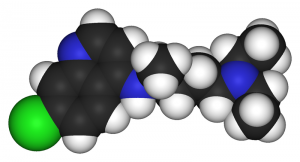
The incidence of gallbladder cancer varies significantly worldwide, with very high rates in South America, Japan, China and Eastern Europe and lower rates in the US and UK. Interestingly gallbladder cancer is also twice as common in women than men, which arguably may be due to increased exposure to the hormone oestrogen.
The prognosis for living with gallbladder cancer is very poor, and thus research into finding an effective treatment is crucially important. Xiao Liang and colleagues have recently published a promising early study on this subject in Cell & Bioscience, reporting the results of a preliminary experiment using the antimalarial drug chloroquine to aid treatment of the cancer.
Gallbladder cancer is notoriously difficult to treat as the symptoms are often vague and go unnoticed in the early stages allowing the cancer to develop and spread to other organs. As most cases are advanced, the main treatment at present is removal of the gallbladder, which carries with it a poor prognosis. In addition, the cancer is often resistant to chemotherapy, and thus this route of treatment has not previously been successful.
The researchers explored the use of chloroquine, a drug traditionally used as an anti-malarial, in combination with a chemotherapeutic agent to enhance its effect and prevent resistance. There are currently no drugs which we can use for this purpose. The benefit of using a well-known drug for this rather than designing a new drug is that we already know that the drug has low toxicity to humans and well-understood pharmacological properties. Using known drugs in this way is called ‘repurposing’.
This preliminary experiment used gallbladder cancer cell lines in-vitro to model the mechanism of action which would occur within the body. The pre-treatment of carcinoma cells with chloroquine resulted in an increased effectiveness of the chemotherapeutic agent 5-fluorouracil (5-FU), causing increased cancer cell death. The chloroquine inhibited the mechanism by which the cancer cells would usually become resistant to the 5-FU, known as autophagy. The authors suggest that the combination therapy of chloroquine and 5-FU should be considered as an effective strategy for the treatment of gallbladder carcinoma in the future.
The next steps for developing the use of this therapeutic combination in the treatment of gallbladder cancer will be a pre-clinical trial using animal models of gallbladder carcinoma in order to test the efficacy and efficiency of chloroquine and 5-FU in-vivo. While we’re still a way off from a new treatment for patients, these novel findings are a promising first step along that road.
Comments